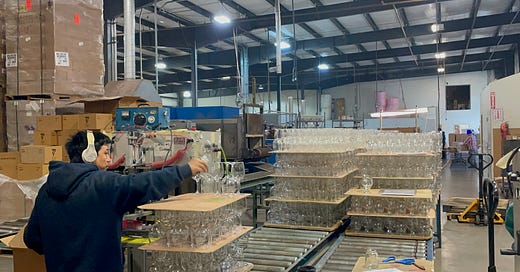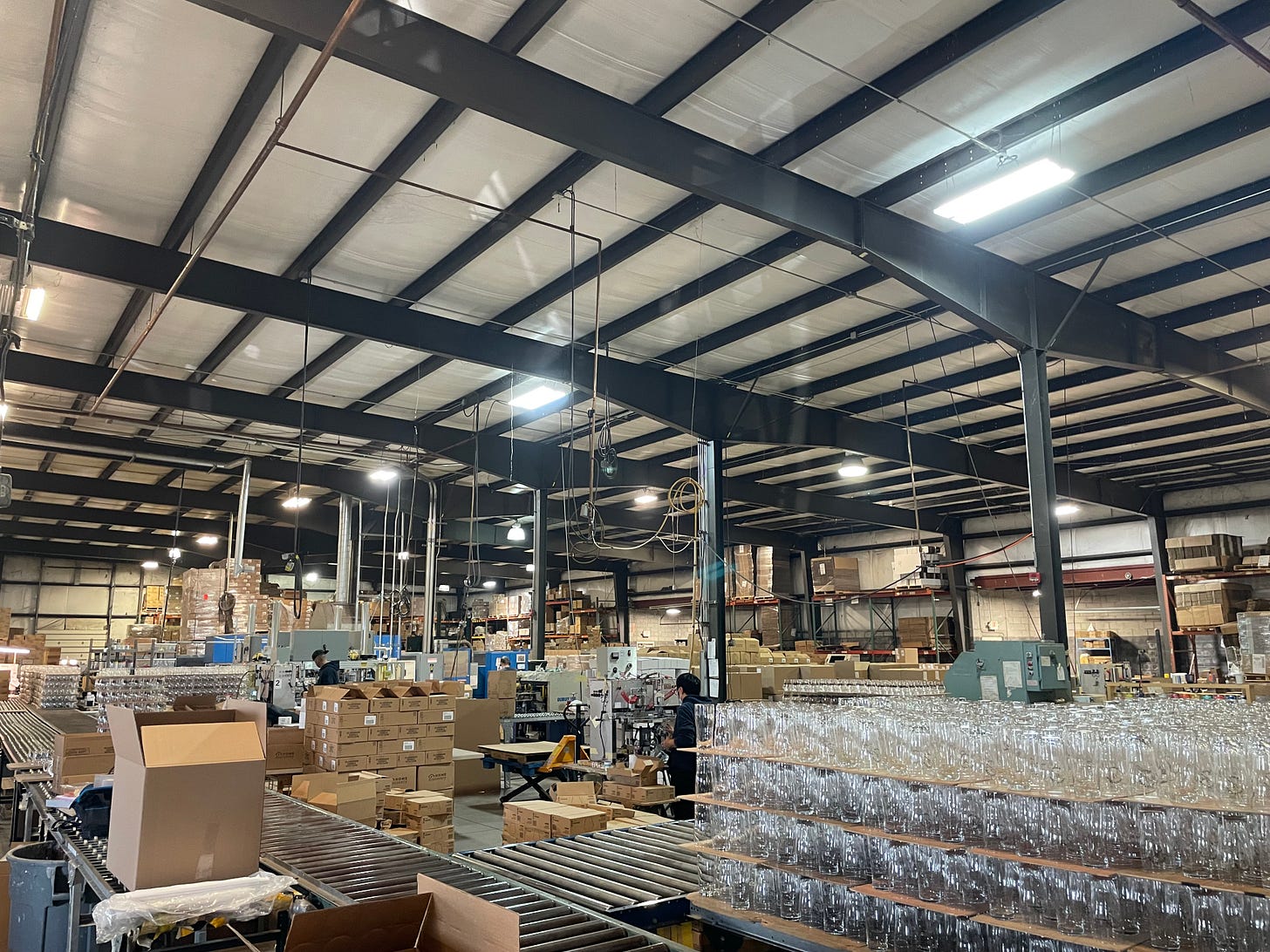Fairport custom glassware maker invests big in future
Déjàbrew, which dates back to 1979, has invested millions in new technology and a new location.
Note: This profile is the result of a paid sponsorship between Déjàbrew and the Cleveland Prost.
Two Johns, well actually one Jon and one John, are helping to put a Fairport glassware company on the national map.
John Regis, owner/president, and Jon Cotterman, vice president, are two of the driving forces behind Déjàbrew, 320 Macedon Center Road, a refreshed company with deep roots in the Rochester area that is now making its mark as a printer and provider of high-quality glassware for many of the country’s best craft breweries, wineries, and spirits producers.
The company’s ascension has been deliberate and quiet. But with the purchase and introduction of new technology, Déjàbrew stands to break through in a bigger way, especially with a huge move on the horizon. (More on that later.)
“We’re just trying to do something cool and it all came to fruition about 18 months ago when I bought the business from my stepfather so that he could retire,” Regis said. “He was pretty old school. We’ve totally changed the culture and the focus. People are excited to be here. We’ve got a great team. We’re laying down the foundational bricks so we can open up to sales. That’s the goal for 2023 and 2024.”
In just the last year, Regis said Déjàbrew have purchased three new machines, which expand the company’s capabilities and range of products it can offer. The company, which was named one of the top 100 businesses in Rochester for 2022 and one of the top workplaces, can do more with multi-colors and invested in processes to use precious metals like gold and silver (used for glassware printing and also halo banding around the rims of glassware).
“We’re just trying to broaden our offerings before we go nuts on the sales strategy,” Regis said.
Déjàbrew stands apart for three main reasons — 1. Flexibility; 2. Location; 3. Expertise. It offers tons of different options for its customers and is easily accessible for regional spots looking to save on shipping. And since it has been around for decades, it can do just about anything a customer wants.
History of the business
“At its inception, the business was only meant for promotional products,” Regis said.
That included working with car dealerships, diners, and a whole host of other businesses to produce items like coffee mugs, ornaments, and glassware.

“Anything you could think of to just put a logo on it to get your name out there.” And that’s still a piece of the business (under Mastercraft Decorators, the parent company). But Déjàbrew has grown into its own entity under the larger umbrella. That’s where Regis and Cotterman see a lot of potential for growth, too.
What it does now
And that’s why they’re doubling down as the company works on a massive expansion and investing millions in new technology and equipment. Through Déjàbrew, the company is able to sell directly to consumers and businesses, often with a lead time quicker than you’d expect. (Most orders can be turned around in less than three weeks.)
Resources just haven’t gone into equipment, they’ve also been directed at streamlining the ordering process in the hopes of making things easier and more convenient for customers. The goal, in the next 12 months, is to roll out a website where customers can upload images and make orders directly.
In the last 18 months, Cotterman said Déjàbrew has tripled its available inventory. In its main production facility in Fairport, the glassware is stacked from floor to ceiling. Just imagine that scene in two other off-site warehouses. Needless to say, there are no shortage of options for breweries, wineries, and other businesses to choose from.
Before recent infrastructure and technology upgrades, Regis said the company’s “bread and butter was one-color imprints for the longest time.” (Think of those promotional macro-brewery glasses you’re sure to find at most bars and restaurants.)
“It’s about volume,” Regis said. “It’s usually 10,000 at a time.”
Déjàbrew also had a machine that could print four colors on a glass, but that process took up to four minutes per glass. Now, the company has an eight-color printing machine that can produce a finished glass in about 90 seconds. Déjàbrew has also purchased and installed two new machines equipped with lasers for etching and engraving. Another laser-equipped machine has been ordered, one that is even more high tech.
What the future looks like
As COVID wanes (or at least the restrictions in place because of it) and supply chain issues begin to normalize, Déjàbrew is poised to jump into action. The company focused on expanding its inventory. But by having so many options in stock, Déjàbrew is able to fulfill orders much quicker.
“We’re in a good spot,” Regis said. Cotterman, who worked in sales before becoming vice president, has a good handle on the Rochester market, Regis said. So the focus is expanding.
Regis loves when brewery owners and brewers stop by the Fairport location, because it often means they’ll be dropping off beers to sample, too. The local list includes spots like Prison City, Mortalis, Roc Brewing, and a bunch of others. It certainly saves on shipping and allows breweries to connect with a fellow local merchant if issues arise.
“We’re still here,” Regis said. “We’ve got a lot of our glass back. We’re spreading out into more offerings, not just glassware. We want people to understand that we’re back.”
By the end of this month or beginning of April, Regis said Déjàbrew will close on a new 57,000-square-foot building in Macedon, Wayne County, that will feature double the current location’s square footage, allowing them to consolidate all storage and operations under one roof. There won’t be any need for box trucks to move inventory between locations.
The new space is right on Route 31 and will be located in a former shopping plaza. Déjàbrew is purchasing the entire plaza, which currently features 10 other tenants like a dog groomer, a hair salon, a restaurant. In its past life, the space was an Ames department store and a movie theater (which will be turned into Déjàbrew office space). In total, the project is expected to cost $5.5 million, Regis said.
“It’s probably 12-16 months before we settle out there,” Regis said, “but it is massively exciting for the future of this business.”
The whole building will be equipped with solar panels in order to take the entire operation completely off the electrical grid, Regis said. They’ll also install a host of electric vehicle chargers in the parking lot.
“We’re really look to revitalize that place and we’ve got some big dreams,” Regis said. “I’m really looking forward to the new place. We’re looking into installing some robots (for automation) and we’re looking into new machines. We’re looking into really innovating more than we have been.”
A note on sponsored content: This profile is part of a paid partnership between Déjàbrew and the Cleveland Prost. For all your custom glassware needs (and more), make sure to visit https://dejabrewusa.com/.







They’ve been a great supporter of the Finger Lakes Craft Beverage Conference. That’s where I first learned about them.